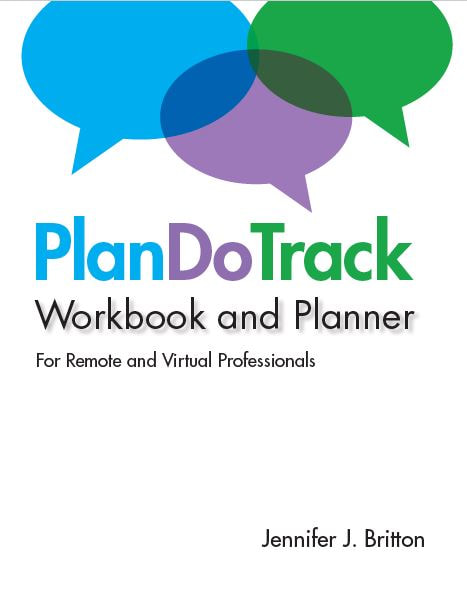|
Collaboration and partnership help us magnify and scale our impact. At least as long as the partnership or collaboration works. Strong partnerships are grounded in a shared vision for the work you are doing together, with clear roles, and usually shared agreements on how you want to work, address issues, and adjust as necessary. While it may be appealing to come together and just wing it, taking some time to design your partnership can be of service to both of you, as well as the people you serve. Before you go to launch a new program you co-facilitate, or partner with new team members, consider these questions:
What other areas do you want to design together as you go to work together? For more on this topic, download a digital chapter I wrote with Effective Group Coaching. You can download the digital chapter here. (use code 4411). There you will find 3 other digital chapters including one on marketing group and team coaching, and two separate case study elements. Be sure to download them today. Enjoy the conversations! Jennifer Jennifer Britton - Potentials Realized
Author of PlanDoTrack (2019), Coaching Business Builder (2018), Effective Virtual Conversations (2017) and From One to Many: Best Practices for Team and Group Coaching (2013). Pick up a copy of any of her books at Amazon. Book Jennifer for a coaching session to explore productivity, teamwork and business issues. Contact her by phone at (416)996-8326 Check out these Instagram accounts @coachingbizbuilder & @remotepathways! Check out upcoming programs on our calendar! Are you a remote professional? Listen into the Remote Pathways Podcast on your favorite podcast player!
0 Comments
While collaboration is something we want to aspire to, what can get in the way? Today’s post picks up with some of the barriers to collaboration I covered in this 2018 Teams365 Blog post. "Politeness is the poison of collaboration." - Edwin Land “Let’s collaborate more” is commonly heard in organizations, and it may be easier said than done. As part of our February posts around collaboration, today’s post explores six barriers to collaboration, along with some possible ways to address these topics. The six barriers we are going to explore in today’s blog post are:
Barrier #1 – Ego. One of the biggest barriers which can get in the way of collaboration is our ego. In collaboration it is important to “park our ego” as much as possible so that we can truly be listening and hearing for what is needed to really synergize. Another commonly used term for parking our ego is “becoming unattached”. When we become too attached to our end result, we may not hear or see possibilities which will actually end with a greater end result. Barrier #2 – Power. When power differentials are too different it can be very difficult to collaborate. In those instances where one group/person may have more “power” whether due to resourcing, or information, it is important to design the boundaries of collaboration and be clear with intent. Barrier #3 - Lack of candor. Candor is defined as “the quality of being open and honest in expression; frankness” in the Oxford Dictionary. Candor is a critical ingredient for collaboration. Without it there will be a lot of wasted effort, and the true essence of collaboration will not be possible. Being able to share ideas without concern for judgement, the ability to be frank and open with feedback are all essential ingredients for collaboration. Barrier #4 - Inability to work across differences. In collaboration synergies, and differences, are usually harnessed. The ability to work across differences, making changes with one’s own style, is another essential ingredient for collaboration. Barrier #5 - Different end goals. When end goals are too different it can be very difficult to have collaboration. For example, if one member is aiming for an end result that is about quality and the other solely on speed, it may be more challenging to find the middle ground amongst the two. In these instances, the end result needs to become an AND rather than an OR. So, A AND B, rather than A OR B. Barrier #6 - Lack of trust. The one essential which will usually arrest collaboration before it starts is lack of trust. When trust is low, or non-existent, it is difficult to collaborate. Collaboration requires honesty, feedback, listening, candor, and bringing your best work to the table, in service to something greater. When trust is low or non-existent, these skills are usually not present. As you consider your upcoming collaboration, how are you doing with these ingredients? What do you see as getting in the way of your conversations? Enjoy your conversations! Jennifer Jennifer Britton - Potentials Realized
Author of PlanDoTrack (2019), Coaching Business Builder (2018), Effective Virtual Conversations (2017) and From One to Many: Best Practices for Team and Group Coaching (2013). Pick up a copy of any of her books at Amazon. Book Jennifer for a coaching session to explore productivity, teamwork and business issues. Contact her by phone at (416)996-8326 Check out these Instagram accounts @coachingbizbuilder & @remotepathways! Check out upcoming programs on our calendar! Are you a remote professional? Listen into the Remote Pathways Podcast on your favorite podcast player! We often talk about collaboration as something we aspire to, or want to do more of, but what are the things we need to ensure we DO In order to have successful collaboration. For today’s post, I am reaching back to a Teams365 blog post, a daily blog I have hosted since 2014. As I shared in Teams365 Blog post #506 – Four Essential Ingredients for Collaboration: 1. Be clear on why you are collaborating. Collaborating for collaboration's sake does not equal success! Why is this collaboration occurring? What is possible due to the fusion of your skills and abilities? What outcomes are you looking for? Partnerships and collaboration are not always a straight road. It's important to be clear on:
2. Consciously design your partnership Take time to intentionally, or consciously, design your partnership. Building in time for focusing on the relationship can be as important as creating or doing the work together. In a recent newsletter article I shared several of the partnership planning questions I have written about over the years. In my writing I talk about at least four stages where you will want to focus conversation - pre-program/partnership, at the start, during the work and at the end of major projects. Refer to chapter 12 of Effective Virtual Conversations or Chapter 11 of From One to Many: Best Practices for Team and Group Coaching. 3. Regularly check in and adjust. Regular check ins will look different for each project. Ask yourselves regular questions such as:
4. Consider what end result you have in mind - As Steven Covey wrote years ago "Start with the end in mind". Our end result shapes our action. As you engage in every conversation think about the end result you are aiming for. How does this influence your partnership? What roles you play? What attention you have? These four factors - clarity, conscious design, check in, and end in mind - support partnering and collaboration to be a flexible, fluid process. What is important for you to consider in your own work? Best wishes, Jennifer Jennifer Britton - Potentials Realized
Author of PlanDoTrack (2019), Coaching Business Builder (2018), Effective Virtual Conversations (2017) and From One to Many: Best Practices for Team and Group Coaching (2013). Pick up a copy of any of her books at Amazon. Book Jennifer for a coaching session to explore productivity, teamwork and business issues. Contact her by phone at (416)996-8326 Check out these Instagram accounts @coachingbizbuilder & @remotepathways! Check out upcoming programs on our calendar! Are you a remote professional? Listen into the Remote Pathways Podcast on your favorite podcast player! I’ve spent a lot of time in the last fifteen years sparking conversations around partnering, teamwork and collaboration. A common question I’ve asked is “what makes your partnership work”? Beyerlein, Nemiro and Beyerlein in their chapter entitled "A Framework for Working Across Boundaries" in The Handbook of Virtual Teams (pg 28, 2008) write that the ingredients for successful collaboration include:
What do you see as the elements required? In the work I have done as a team coach, there are usually four factors which are mentioned regularly by the teams and groups I work with:
Without Trust, it is unlikely that the relationship will sustain itself and that goals will be achieved to the amount that they can be. Trust is the foundation of most great partnerships. How are you being transparent with each other? What are you doing to follow through on what you said you would do? What are you doing to offer feedback in order to further your relationship and results? Trust is one of the four cornerstones of great partnership and is linked back to the behaviors which can be seen. The second cornerstone is Complimentary Skills. Complimentary skills are important in partnerships to help you accelerate or augment what is possible. If skills are too similar and you are cloning each other, it is likely that a huge blindspot will be created. Planning involves having a shared vision, meeting regularly to pause, making adjustments and thinking about what’s working and what’s not. Having a shared vision for your work or projects is a key element of success. Questions you may want to ask regularly:
Finally, what can you do to Leverage Strengths? We naturally bring elements to the table. What are the things we can do to augment what we are naturally talented with? Our talents/strengths usually create a unique mindset or approach to our work. In the partnership, how is each person uniquely positioned? All the best, Jennifer Jennifer Britton - Potentials Realized
Author of PlanDoTrack (2019), Coaching Business Builder (2018), Effective Virtual Conversations (2017) and From One to Many: Best Practices for Team and Group Coaching (2013). Pick up a copy of any of her books at Amazon. Book Jennifer for a coaching session to explore productivity, teamwork and business issues. Contact her by phone at (416)996-8326 Check out these Instagram accounts @coachingbizbuilder & @remotepathways! Check out upcoming programs on our calendar! Are you a remote professional? Listen into the Remote Pathways Podcast on your favorite podcast player! 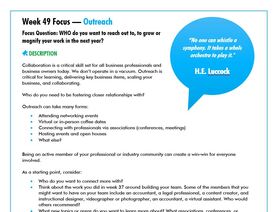 Week 49 Focus — Outreach Focus Question: WHO do you want to reach out to, to grow or magnify your work in the next year? Description Collaboration is a critical skill set for all business professionals and business owners today. We don’t operate in a vacuum. Outreach is critical for learning, delivering key business items, scaling your business, and collaborating. Who do you need to be fostering closer relationships with? Outreach can take many forms:
Being an active member of your professional or industry community can create a win-win for everyone involved. As a starting point, consider:
Activity Return to your vision and think about WHO you need to help you grow your business. Connection to the Workbook and Planner Revisit your Relationship Web and List of 20 Key Business Relationships. Networking and outreach are two-way streets. What are you bringing to the relationship as well? Review the sections around collaboration in Sections 3 and 4. Consider integrating some of the questions posed in the collaboration section. Download a one-page copy of this week's 52 Weeks of Plan, Do and Track here. Best wishes, Jennifer Read and download the initial weeks of the 52 weeks of Plan, Do and Track Jennifer Britton - Potentials Realized
Author of PlanDoTrack (2019), Coaching Business Builder (2018), Effective Virtual Conversations (2017) and From One to Many: Best Practices for Team and Group Coaching (2013). Pick up a copy of any of her books at Amazon Book Jennifer for a coaching session to explore productivity, teamwork and business issues. Contact her by phone at (416)996-8326 Check out the new 19 Productivity Tips on-demand program. Explore this video based program at your own pace, and join Jennifer for bi-weekly calls as part of your course. Follow the #90DaysPlanDoTrack series on Instagram This week’s Weekly Planning Hack gets you to think about your relationships and who you have in your web, who can help you with a major project or task that isn’t getting done. We do not operate in isolation and reaching out to others for support and collaboration can be important in getting things done. A few weeks ago, I wrote about planning first, and writing a book. There may be some people in your network who could help you with this. For other projects, like the paper management organizing mentioned in week 35, you may need to enroll family members like a spouse or kids to wade your way through the paper. What is important to note about relationships this week? Each February I often put a spotlight around relationship management issues. In PlanDoTrack, I also zoom into this topic area and invite business owners and remote workers to take stock of the Top 20 people in your network. Knowing who you can reach out to is important, especially in times of urgency. If you have not yet completed the exercise, be sure to check out the Top 20 Exercise on page 87 of PlanDoTrack. Enjoy your exploration! Jennifer Jennifer Britton - Potentials Realized
Author of PlanDoTrack (2019), Coaching Business Builder (2018), Effective Virtual Conversations (2017) and From One to Many: Best Practices for Team and Group Coaching (2013). Pick up a copy of any of her books at Amazon Book Jennifer for a coaching session to explore productivity, teamwork and business issues. Contact her by phone at (416)996-8326 Check out the new 19 Productivity Tips on-demand program. Explore this video based program at your own pace, and join Jennifer for bi-weekly calls as part of your course. Follow the #90DaysPlanDoTrack series on Instagram 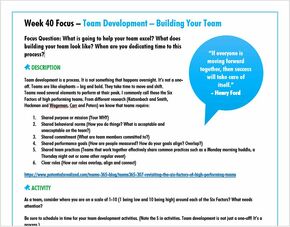 Week 40 Focus – Team Development – Building Your Team Focus Question: What is going to help your team excel? What does building your team look like? When are you dedicating time to this process? Description Team development is a process. It is not something that happens overnight. It’s not a one-off. Teams are like elephants – big and bold. They take time to move and shift. Teams need several elements to perform at their peak. I commonly call these the Six Factors of high performing teams. From different research (Katzenbach and Smith, Hackman and Wageman, Carr and Peters) we know that teams require:
Activity As a team, consider where you are on a scale of 1-10 (1 being low and 10 being high) around each of the Six Factors? What needs attention? Be sure to schedule in time for your team development activities. (Note the S in activities. Team development is not just a one-off! It’s a process.) Connection to the Workbook and Planner Share resources with you team from the workbook plan. Could they benefit from having a copy themselves? Download a one-page copy of this week's 52 Weeks of Plan, Do and Track here. Best wishes, Jennifer Read and download the initial weeks of the 52 weeks of Plan, Do and Track Jennifer Britton - Potentials Realized
Author of PlanDoTrack (2019), Coaching Business Builder (2018), Effective Virtual Conversations (2017) and From One to Many: Best Practices for Team and Group Coaching (2013). Pick up a copy of any of her books at Amazon Book Jennifer for a coaching session to explore productivity, teamwork and business issues. Contact her by phone at (416)996-8326 Check out the new 19 Productivity Tips on-demand program. Explore this video based program at your own pace, and join Jennifer for bi-weekly calls as part of your course. Follow the #90DaysPlanDoTrack series on Instagram 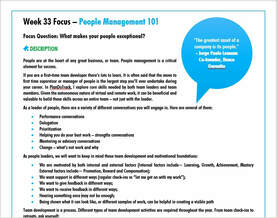 Week 33 Focus – People Management 101 Focus Question: What makes your people exceptional? Description People are at the heart of any great business, or team. People management is a critical element for success. If you are a first-time team developer there’s lots to learn. It is often said that the move to first time supervisor or manager of people is the largest step you’ll ever undertake during your career. In PlanDoTrack, I explore core skills needed by both team leaders and team members. Given the autonomous nature of virtual and remote work, it can be beneficial and valuable to build these skills across an entire team – not just with the leader. As a leader of people, there are a variety of different conversations you will engage in. Here are several of them:
Activity Consider your skill base right now. What is one skill area you could become more effective in to boost your impact as a people leader? Connection to the Workbook and Planner Complete the Wheel of Virtual and Remote Work in PlanDoTrack and review the skills listed in Section 1 of PlanDoTrack. What do you notice? Where can you improve? Download a one-page copy of this week's 52 Weeks of Plan, Do and Track here. Best wishes, Jennifer Read and download the initial weeks of the 52 weeks of Plan, Do and Track Jennifer Britton - Potentials Realized
Author of PlanDoTrack (2019), Coaching Business Builder (2018), Effective Virtual Conversations (2017) and From One to Many: Best Practices for Team and Group Coaching (2013). Pick up a copy of any of her books at Amazon Book Jennifer for a coaching session to explore productivity, teamwork and business issues. Contact her by phone at (416)996-8326 Check out the new 19 Productivity Tips on-demand program. Explore this video based program at your own pace, and join Jennifer for bi-weekly calls as part of your course. Follow the #90DaysPlanDoTrack series on Instagram 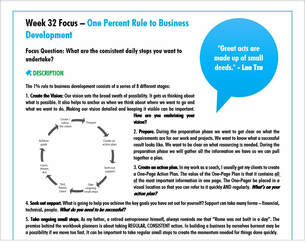 Week 32 Focus – One Percent Rule to Business Development Focus Question: What are the consistent daily steps you want to undertake? Description Since 2005 I have been sharing what I call the One Percent Rule to Business Development. I've heard from a lot of entrepreneurs that they like this notion of incremental business action. So here it is! The 1% rule to business development consists of a series of 8 different stages: 1. Create the Vision: Our vision sets the broad swath of possibility. It gets us thinking about what is possible. It also helps to anchor us when we think about where we want to go and what we want to do. Making our vision detailed and keeping it visible can be important. How are you enshrining your vision? 2. Prepare. During the preparation phase we want to get clear on what the requirements are for our work and projects. We want to know what a successful result looks like. We want to be clear on what resourcing is needed. During the preparation phase we will gather all the information we have so we can pull together a plan. 3. Create an action plan. In my work as a coach, I usually get my clients to create a One-Page Action Plan. The value of the One-Page Plan is that it contains all of the most important information in one page. The One-Pager be placed in a visual location so that you can refer to it quickly AND regularly. What’s on your action plan? 4. Seek out support. What is going to help you achieve the key goals you have set out for yourself? Support can take many forms – financial, technical, people. What do you need to be successful? 5. Take ongoing small steps. As my father, a retired entrepreneur himself, always reminds me that “Rome was not built in a day”. The premise behind the workbook planners is about taking REGULAR, CONSISTENT action. In building a business by ourselves burnout may be a possibility if we move too fast. It can be important to take regular small steps to create the momentum needed for things done quickly. 6. Test, Learn, Retest. In the sixth step were going to test things out. Today's volatility and complexity requires that we experiment regularly. With the data we receive from the initial test or action we can learn and apply then retest and learn again. This is an iterative process which continues. Throughout the business cycle we may move through different bouts of experimentation. Each cycle creates an opportunity for learning and growth. 7. Learn, Iterate and Act. Each action creates a reaction, which over time creates its own momentum, making it easier to achieve the goal. Along the way learning and feedback will help to shape what we do. 8. Ultimately our goal is achieved. Based on our experience we will further refine the vision that we set out for ourselves, expanding it or modifying it based on our experience. This will further support and shape our actions are we move forward with the next cycle and process. This cycle may take place in a short amount of time, for example a day or it may be phased over the longer term of a project. Activity Using your business or a current project, work through the One Percent Rule. What can action and learning look like around one of your most important goals? Map out the 8 steps of the One Percent Rule. Connection to the Workbook and Planner Refer to the One Percent Rule to Business in Section 1 on page 29 of the Coaching Business Builder, or page 31 of PlanDoTrack. Download a one-page copy of this week's 52 Weeks of Plan, Do and Track here. Best wishes, Jennifer Read and download the initial weeks of the 52 weeks of Plan, Do and Track Jennifer Britton - Potentials Realized
Author of PlanDoTrack (2019), Coaching Business Builder (2018), Effective Virtual Conversations (2017) and From One to Many: Best Practices for Team and Group Coaching (2013). Pick up a copy of any of her books at Amazon Book Jennifer for a coaching session to explore productivity, teamwork and business issues. Contact her by phone at (416)996-8326 Check out the new 19 Productivity Tips on-demand program. Explore this video based program at your own pace, and join Jennifer for bi-weekly calls as part of your course. Follow the #90DaysPlanDoTrack series on Instagram 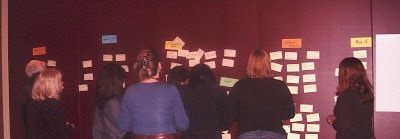 This week’s Weekly Planning Hack focuses on the Power of a Post It. From being an important visual reminder, to helping teams focus on what’s important, the power of a post-it can become a colorful way to prioritize and focus. Here are a couple of ways you might consider using post its to help you with your productivity:
Here’s what I wrote in a 2008 blog posts on post its called A Facilitator’s Ally: Post Its and Index Cards: I love post it notes and index cards! Many of you will know that it made my top 10 list of most useful tips and tools for 2007. Today's post, builds on a much older post of mine from last year, about how post it notes and index cards can be a really valuable tool in your toolbox. Here are some ideas on how you can use post-its and/or index cards: 1. For program development. Using a new post it or index card, brain storm all the ideas you have about upcoming programs. Lay them out on a table or floor to start sorting/grouping. 2. To get quick feedback from all participants during a program. As an evaluation tool, have participants write out their responses to your evaluation questions (1 question/answer per card), and have them post them on the wall. 3. For business planning or strategic planning sessions. The photo above is from a recent team planning session I facilitated late last year. There is nothing like getting people up and moving to boost engagement, excitement and ownership of their work! 4. As a quick poll of the group regarding what questions are popping for the group. 5. To ensure that all voices of the group are being heard. It is quite common for groups to be dominated by certain members. As a facilitator it's important to ensure that all voices are heard. Having participants write out their questions or responses, and then post them, or share them, can provide participants who introverts are, shyer or those who require more time to process questions, the opportunity to participate and "be heard". 6. As a "vote" regarding where to go. Have participants show their support for a discussion item by putting up a post it note. (Different colours can represent different categories.) 7. As a brainstorming tool. You can bring post-its/index cards into exercises where participants want to/need to brainstorm. For example,
Here’s a link to that original post. Enjoy your use of post its! Jennifer Jennifer Britton - Potentials Realized
Check out the Weekly Planning Hack Facebook Live each Wednesday or Thursday here. Be sure to like our page to be updated each week! Author of PlanDoTrack (2019), Effective Virtual Conversations (2017) and From One to Many: Best Practices for Team and Group Coaching (2013) |
AuthorJennifer Britton is the blogger behind the popular Teams365 blog, a daily,blog for team leaders and members since 2014. Her latest publication is the PlanDoTrack Workbook and Planner. Pick up a copy at Amazon. Pick Up a CopyUpcoming Programs
Join us for the 21 For 21 Virtual Co-working Sprints - $21 US. Want to access the recordings and bonus worksheets? Join us at the Booster Pack $79 US early bird rate. Sign up at 21for21 Virtual Co-working - STAND OUT VIRTUALLY! Stand Out Virtually - Incubator - Running an online, virtual or digital business and want to get the word out to organizations? Join us for the 8 week Stand Out Virtually Incubator. Next group starts April 2021. Build out your brand, offers and proposals. Virtual Facilitation Essentials (8.5 CCEs)- Expand your toolkit for better remote and virtual conversations. This is a virtual train-the-trainer - 5 weeks: Fall 2021 programming starts in October $495 US Learn more and register. Coaches! Register for the 60 Day Coaching Business Builder Accelerator. Join us for 60 Days support and ACTION for coaches wanting to grow their businesses. On-Demand Course. PlanDoTrack Facilitator Training Program (24 CCEs) - Starts again in October. Contact Jennifer to discuss. Month-End/Quarterly Planning Session: Thursday September 30th - 8 -9 am ET Archives
January 2021
Categories
All
|




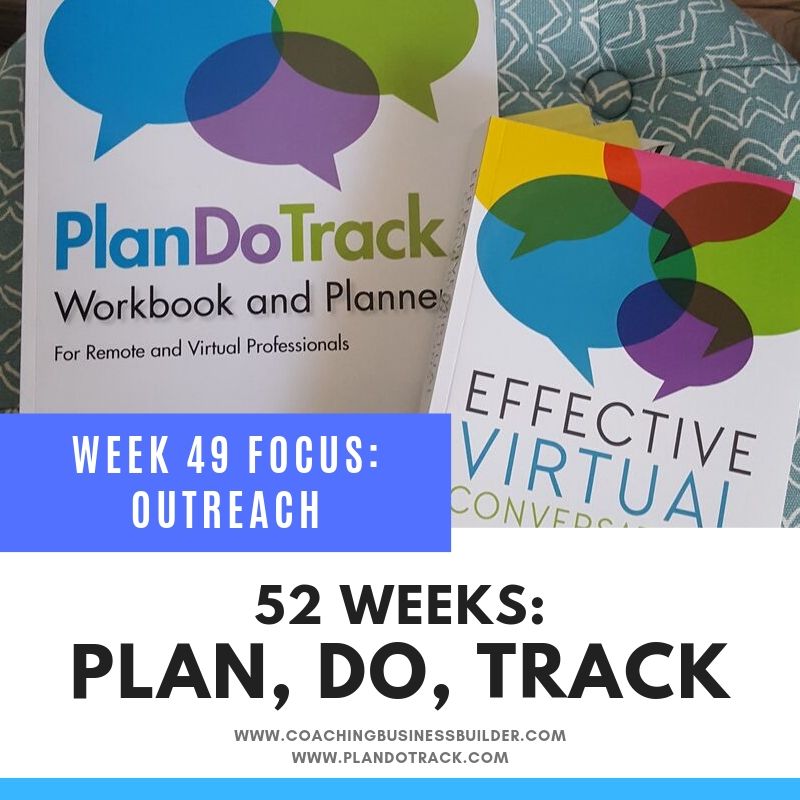
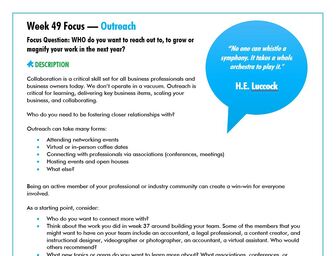
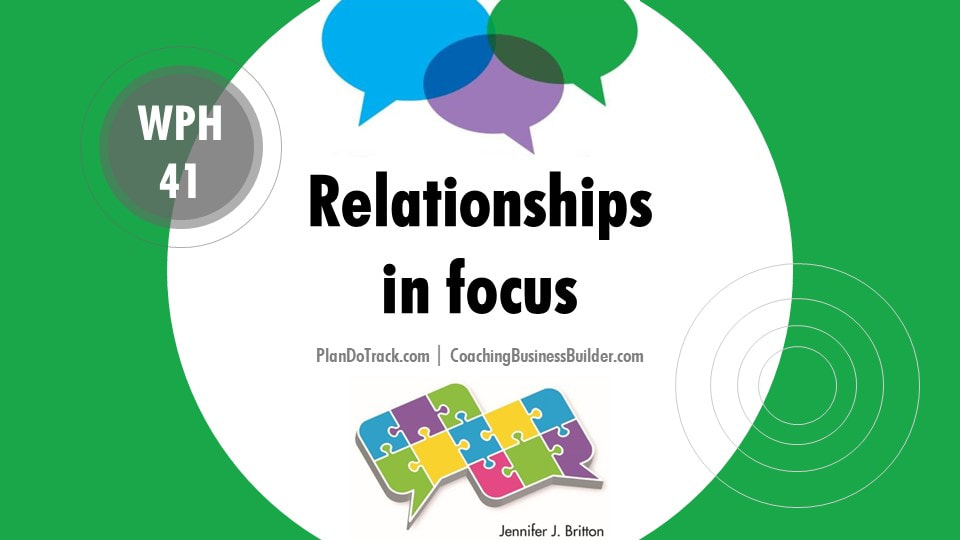
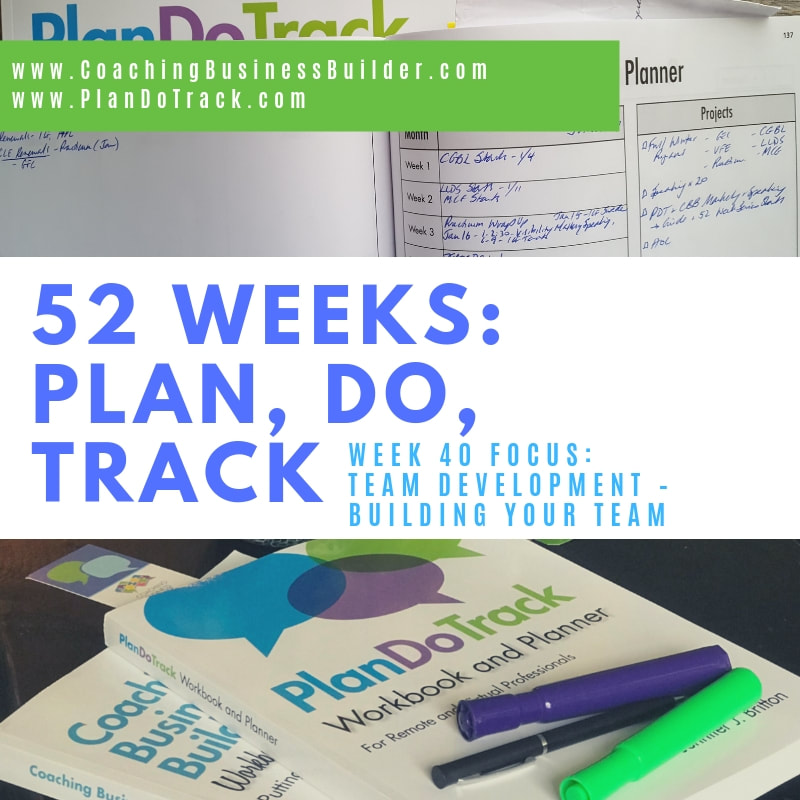
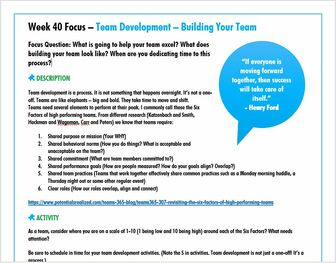
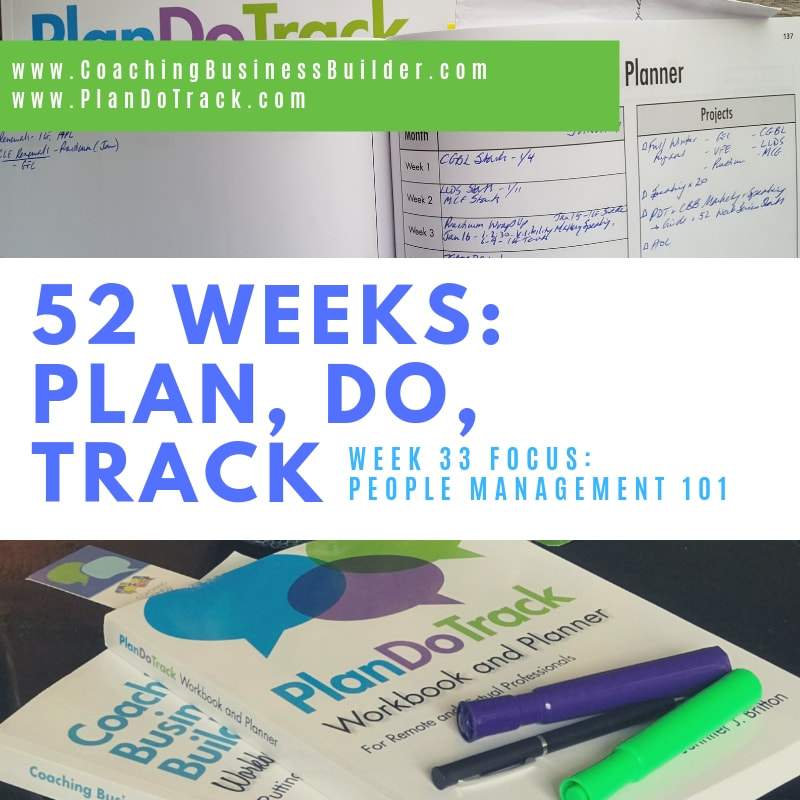
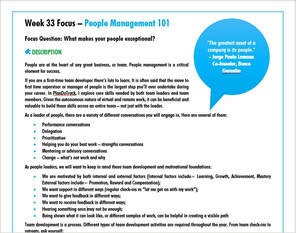
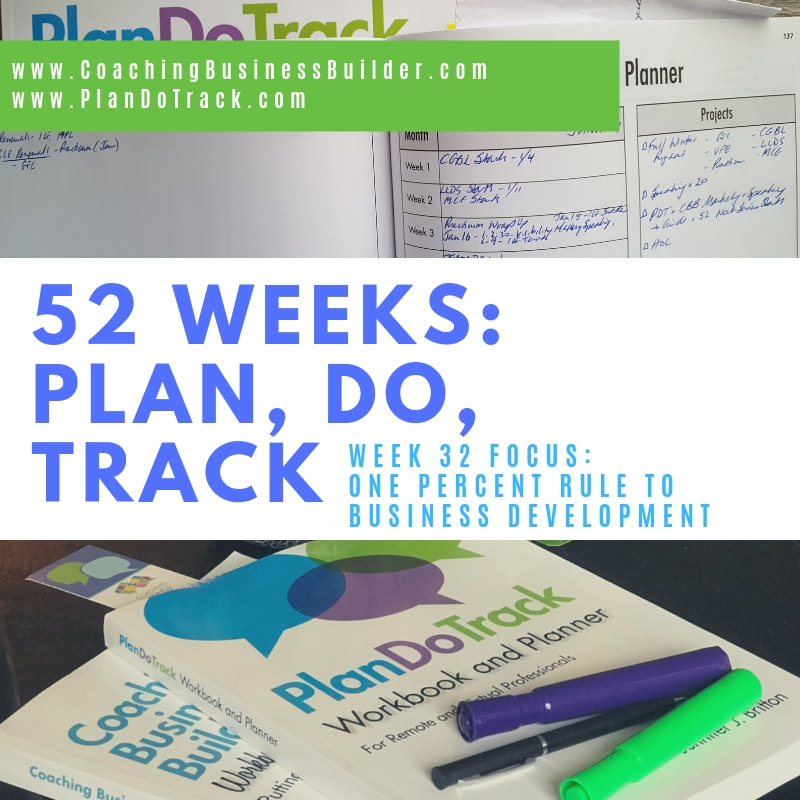
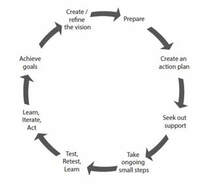
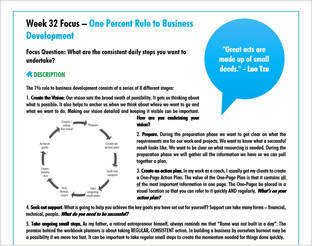
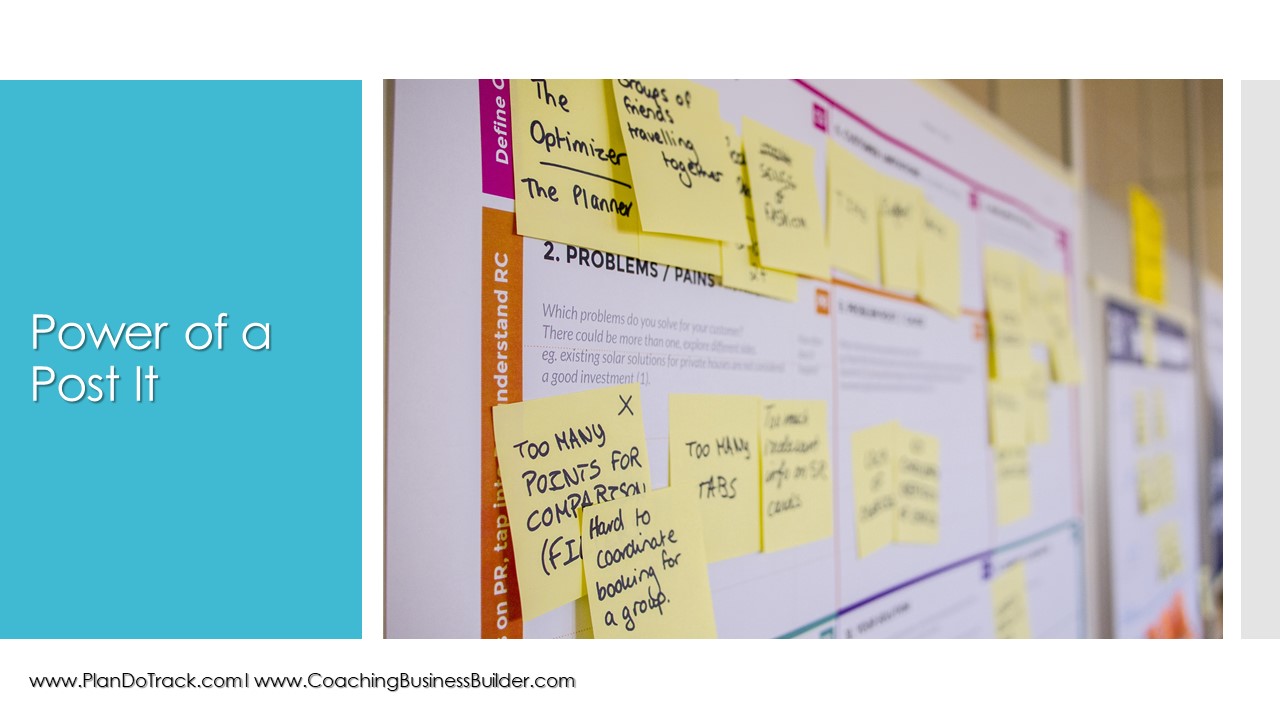
 RSS Feed
RSS Feed
